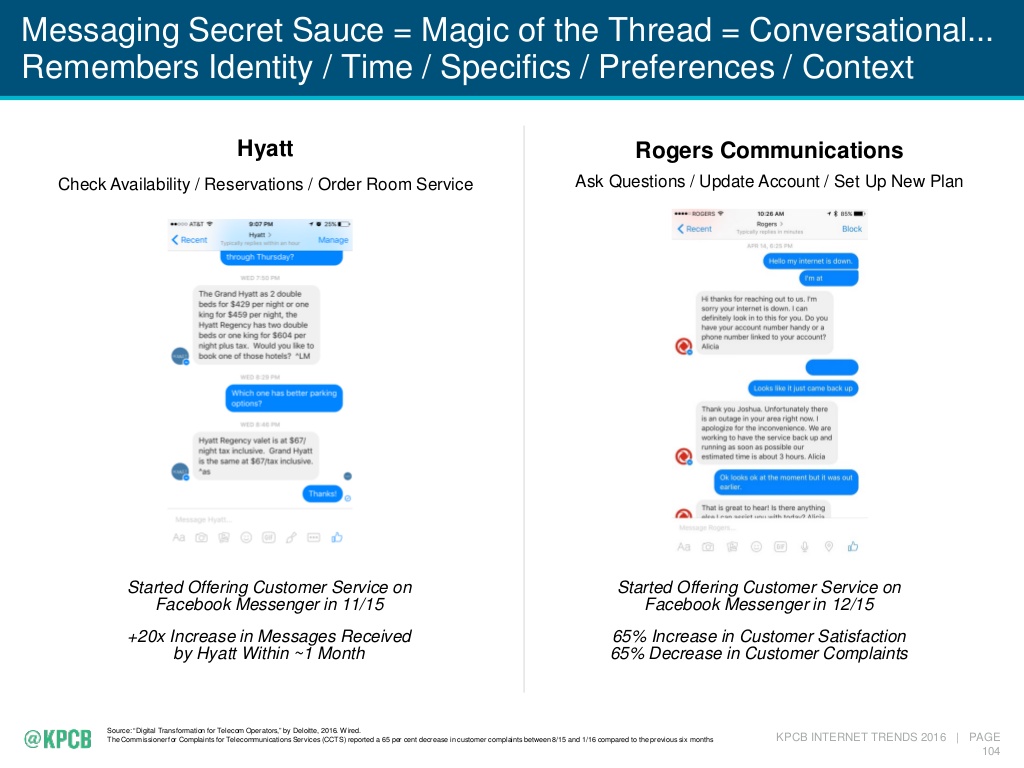Mary Meeker’s latest report highlighted the rise of messenger app usage (and the Facebook gap). This slide was particularly telling:

Notice the results: a 20x increase in messages received by Hyatt. This is significant, and important. People are extremely comfortable using Facebook Messenger to engage with companies. A few other items to notice:
- Hyatt only started offering this in November last year ie it is only 6 months ago – and thus a very new trend
- The response was rapid ie within a month – it wasn’t a slow build
You may be tempted to dismiss the finding, especially if you aren’t in the hotel business. I’ve had two customers do that this past week. They (understandably) say:
‘But we’re not a hotel chain, we’re a B2B technology company – IT Managers and CIOs don’t want to interact with us via Facebook Messenger’
This is limited thinking. And dangerous. You can be sure that IT Managers and CIOs are interacting with Hyatt via Facebook Messenger, so why wouldn’t they want to interact with other (perhaps all) companies in the same way?
It’s not just the *young kids* who are using Messenger (although it may well be the majority at the moment). Everyone (and I mean everyone) is getting familiar with Facebook[1] in Western societies[2]. You need to be interacting with your prospects in the manner they find most comfortable.
An additional consideration: currently Facebook Messenger interaction is associated as being part of Customer Service. Prospects often prefer talking to customer service because the think they’ll get answers, as opposed to marketing guff (from marketers) and sales pressure (from ‘business development managers’). This won’t last long once marketing departments jump on the messenger trend.
As ebook fatigue sets in and prospects no longer want to fill in forms on landing pages, the shift to chat options, particularly messenger channels that have identity[3] built in, will be rapid. Many will be taken by surprise, especially if they miss the opportunity.
Now’s the time to take advantage of the shift.
[1] Note that there is a big difference between Facebook user demographics and Facebook Messenger demographics, but finding reliable data to compare them is difficult. For the purposes of this post I’m possibly conflating them too much – so keep that in mind.
[2] In non-western locations, obviously you’d need to embrace the platforms that are prevalent there. This is especially important for multinationals who service multiple cultures eg country needs to have it’s own clear understanding of the best communication channels.
[3] The days of having to fill in chat popups with lots of identity stuff before you can even interact are fast disappearing. If you don’t have identity easily integrated you’re adding a hurdle to interaction.
[…] friends. When Hyatt started using Facebook Messenger for customer service last year, they saw a 20x increase in FB messages within a month. Customers were ready and willing to communicate, they just needed […]
[…] friends. When Hyatt started using Facebook Messenger for customer service last year, they saw a 20x increase in FB messages within a month. Customers were ready and willing to communicate, they just needed […]
[…] friends. When Hyatt started using Facebook Messenger for customer service last year, they saw a 20x increase in FB messages within a month. Customers were ready and willing to communicate, they just needed […]